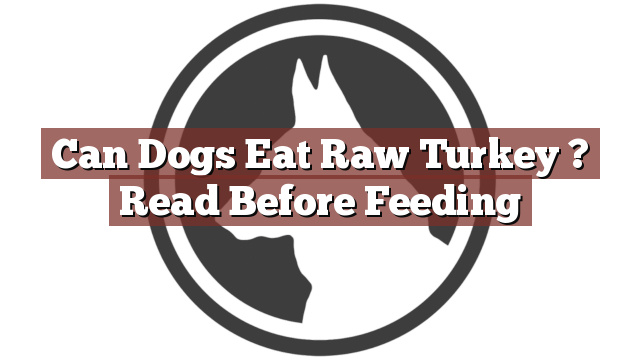Understanding Your Dog’s Dietary Needs
As a responsible dog owner, it is crucial to understand your furry friend’s dietary needs. Dogs are omnivores, meaning they can consume a variety of foods. However, their digestive systems are different from ours, and certain foods that are safe for us can be harmful to them. It is always important to do your research and consult with a veterinarian before introducing any new food into your dog’s diet.
Can Dogs Eat Raw Turkey? Read Before Feeding
Can dogs eat raw turkey? This is a question that often arises during festive seasons when turkey is a common dish on the table. The answer is yes, dogs can eat raw turkey, but it comes with some important considerations. While raw turkey is not toxic to dogs, there are potential dangers and risks associated with feeding it to your furry friend. It is essential to weigh the pros and cons before deciding to include raw turkey in your dog’s diet.
Pros and Cons of Feeding Raw Turkey to Dogs
Feeding raw turkey to your dog has its advantages and disadvantages. On the positive side, raw turkey is a great source of lean protein, which is essential for your dog’s overall health and muscle development. It also contains vitamins and minerals that contribute to a balanced diet. However, there are potential risks involved. Raw turkey may contain harmful bacteria such as Salmonella or Campylobacter, which can lead to food poisoning in dogs. These bacteria can cause symptoms like vomiting, diarrhea, and even more severe health issues.
Another concern is the bones present in raw turkey. Cooked bones become brittle and can splinter easily, posing a choking hazard or causing internal injuries if swallowed. While raw bones are less likely to splinter, they can still cause issues if ingested in large pieces or if your dog has a sensitive digestive system.
Conclusion: Weighing the Benefits and Risks of Raw Turkey for Dogs
Can a dog eat raw turkey? Yes, but is it worth the potential risks? It is crucial to consider the possible dangers before feeding your dog raw turkey. While it can provide nutritional benefits, the presence of harmful bacteria and the risk of bone-related injuries should not be taken lightly.
If you decide to include raw turkey in your dog’s diet, it is essential to take precautions. Ensure that the turkey is fresh and from a reputable source. Thoroughly wash your hands and all surfaces that come into contact with the raw meat to prevent the spread of bacteria. Furthermore, consider deboning the turkey and cutting it into small, manageable pieces to minimize the risk of choking or blockage.
In conclusion, while dogs can eat raw turkey, it is crucial to assess the benefits and risks associated with this particular food choice. Consulting with your veterinarian is highly recommended to ensure your dog’s dietary needs are met safely and appropriately.
Thank you for taking the time to read through our exploration of [page_title]. As every dog lover knows, our furry friends have unique dietary needs and responses, often varying from one canine to another. This is why it's paramount to approach any changes in their diet with caution and knowledge.
Before introducing any new treats or making alterations to your dog's diet based on our insights, it's crucial to consult with a veterinarian about [page_title]. Their expertise ensures that the choices you make are well-suited to your particular pet's health and well-being.
Even seemingly harmless foods can sometimes lead to allergic reactions or digestive issues, which is why monitoring your dog after introducing any new food item is essential.
The content provided here on [page_title] is crafted with care, thorough research, and a genuine love for dogs. Nevertheless, it serves as a general guideline and should not be considered a substitute for professional veterinary advice.
Always prioritize the expert insights of your veterinarian, and remember that the health and happiness of your furry companion come first.
May your journey with your pet continue to be filled with joy, love, and safe culinary adventures. Happy reading, and even happier snacking for your canine friend!

